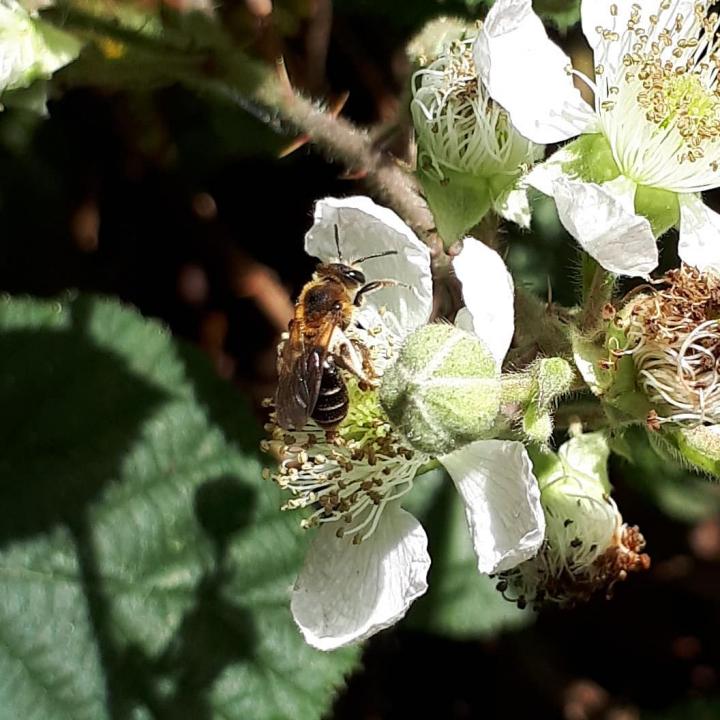New research shows that for every £1 invested in pollinator monitoring schemes, at least £1.50 can be saved, from otherwise costly independent research projects

Credit: Tom Breeze
New research shows that for every £1 invested in pollinator monitoring schemes, at least £1.50 can be saved, from otherwise costly independent research projects.
A research team from the University of Reading and the UK Centre for Ecology & Hydrology is studying how to improve pollinator monitoring in the UK in a cost-effective manner. The preliminary results are presented today at the British Ecological Society’s annual meeting in Belfast.
Dr. Tom Breeze, researcher at the University of Reading, who will be presenting the research, said “The study shows that scientifically robust pollinator monitoring schemes, regardless of their size or structure, are cost-effective and add tremendous value to food security and wider scientific research”.
Despite the urgent need, monitoring insect pollinators (especially wild bees and hoverflies) has often been considered too expensive to implement at a national scale. This research examines hidden benefits of monitoring schemes. By pooling data and expertise from a wide range of resources, the costs of schemes have been estimated to be between £5,600 for a small volunteer-led scheme collecting basic data and £2.8 million per year for professional monitoring of both pollinating insects and pollination to the UK’s crops.
This research combined a series of methods to examine potentially hidden benefits of monitoring schemes, in monetary terms. The authors used a type of statistical method called power analysis to assess how many sites should be sampled to be able to detect a 30% change in insect populations over 10 years, assuming each site was visited by surveyors four times per year. A 30% change was used as a conservative estimate for how pollinator populations may be projected to decrease over the next 10 years, at a rate of 3% per year.
Bioeconomic models were used to estimate the impact of pollinator losses on the yields of insect pollinated crops grown in the UK. These include apples, berries, beans, oilseed rape and tomatoes. The monetary value of the scheme to scientists was estimated by asking leading pollinator researchers across Europe how they would design networks to answer eight research questions about wild pollinators.
The study concluded that these hypothetical monitoring schemes would be cheaper to implement than multiple research projects because administrative and management costs are lower, due to a single centralised network, rather than several, devolved smaller projects.
Dr. Breeze highlights the importance of pollinators in the UK landscape, “Pollinators are vital for our food security but are under threat from landscape and climate changes. Monitoring pollinator populations is vital to understanding the status and trends of these animals and identifying areas where we need to take dedicated action.”
It is hoped that this will “protect pollination services to crops and add value as scientific infrastructure”, said Dr. Breeze, from the University of Reading.
However, these estimates of the economic benefits of pollination only directly apply to farmers. It is anticipated that, through keeping prices low, they will indirectly provide further value to supermarkets and consumers.
Issues with relying on citizen science monitoring networks are that most volunteers have little experience and may struggle to distinguish between many species in the field. As a result, a network of fully trained professionals could supply higher resolution data.
However, in the UK, there is a strong culture of existing volunteer insect recorders which can be capitalised upon, such as the new Pollinator Monitoring Scheme (PoMS), the Bees, Wasps and Ants Recording Society, the Dipterists Forum and the Bumblebee Conservation Trust.
Dr. Breeze suggested that “A scheme that combines existing pollinator monitoring efforts with additional professional research efforts should be explored as a way to deliver the best of both worlds”.
One limitation of the study is that the power analysis cannot distinguish between the relative research quality of different networks. It is assumed that fully professional schemes would add more consistent value to science. Alternatively, volunteer-focussed schemes allow opportunities for public engagement with conservation as well as influencing attitudes to nature and may also provide high quality research.
Dr. Breeze highlighted that governments should consider pollinator monitoring as an excellent investment from both a food security and scientific perspective.
###
Other co-authors emphasised that “Pollinators have received extra attention because of their value as ecosystem service providers but biodiversity monitoring in general should be thought of as a major investment in long-term research to help us better understand the world we live in.”
Dr. Tom Breeze will present the group’s work on Wednesday 11 December 2019 at the British Ecological Society annual meeting. The conference will bring together 1,200 ecologists from more than 40 countries to discuss the latest research.
Media Contact
Sicily B. Fiennes
[email protected]
44-752-596-6919
Original Source
https:/




